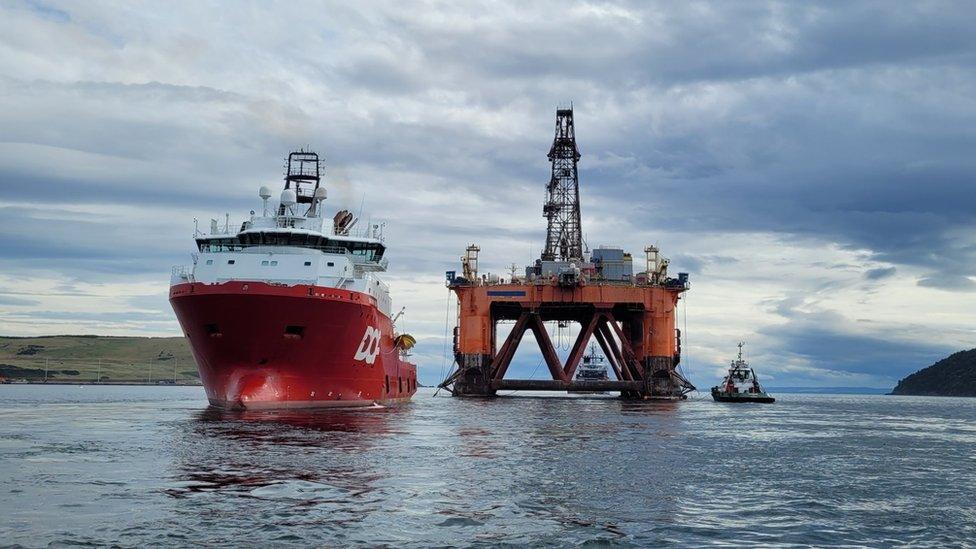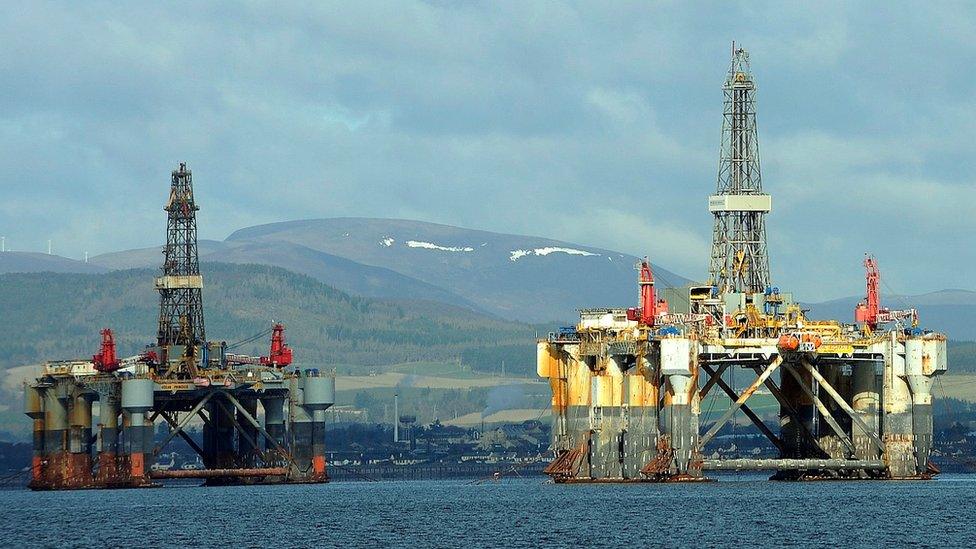Oil rigs detained in Cromarty Firth will now be dismantled legally
- Published

The Ocean Vanguard left Scotland on Thursday
Three North Sea oil rigs which were set to be dumped on an Indian beach will now be dismantled legally in Turkey.
The Ocean Vanguard, Ocean Princess and Ocean Nomad have been detained in the Cromarty Firth since 2018 by the Scottish Environment Protection Agency.
The rigs were formerly owned by Dubai-based Global Marketing Systems (GMS).
Sepa stepped in over fears that it planned to take them overseas in potential violation of international laws on transporting hazardous waste.
A BBC investigation from 2020 revealed their likely destination was Alang in India, where ships are beached and dismantled by low-paid migrant workers in dirty and often dangerous conditions.
GMS had purchased the rigs from North Sea oil firm Diamond Offshore, which has a base in Aberdeen.
GMS has previously denied that it intended to flout international laws.
In June, the company sold the rigs to a new owner which has reached an agreement with Sepa to dismantle them at an accredited shipyard in Turkey.
The Ocean Vanguard left Scotland on Thursday. The Ocean Princess and Ocean Nomad are expected to follow over the next nine months.
Sepa's Colin Morrow said the environmental watchdog was content that the destination yard is EU-approved and has all the necessary consents in place.
"It is important we work with partner agencies across the world to ensure that infrastructure which has driven our prosperity doesn't become another country's environmental problem," he said.

The Ocean Princess and Ocean Nomad have been detained in the Cromarty Firth since 2018
Unlike in India, where there are no scrapyards accredited to dismantle European vessels, facilities in Turkey meet stringent EU safety and environmental laws.
Vessels are dismantled above the tide line on concrete platforms, which prevent hazardous chemicals leaking into the sea and soil.
Ingvild Jenssen, director of the pressure group Shipbreaking Platform, said: "Turkey is a legal destination under international waste law and the conditions there are better than they are in India, Bangladesh and Pakistan."
But she added: "Whilst it might be a legal destination, we do have some concerns it might not be the best destination for these platforms."
Ilker Sari, the president of Rota Shipping, which now owns the Cromarty rigs, admitted that conditions could be better.
"Recycling a vessel or a rig in a dry dock is the best possible way to do it, but operationally it's very expensive and in most cases it doesn't make it feasible," he said.
There are only two fully accredited shipbreaking yards in the UK - both in Scotland - and there are concerns the industry will not have the capacity to meet future decommissioning needs, leading to more North Sea rigs ending up dumped on South Asian beaches.
"It definitely needs to change," added Ingvild Jenssen.
"There is a need to build up proper capacity to recycle them sustainably."
BBC Scotland revealed in 2020 that two other rigs previously sold to GMS by Diamond Offshore ended up beached in India.
The Disclosure programme travelled to Alang to investigate the conditions workers were subject to while breaking up those rigs.
Disclosure: A Deadly Trade will be broadcast at 22:40 on Tuesday 6 September on BBC One Scotland.